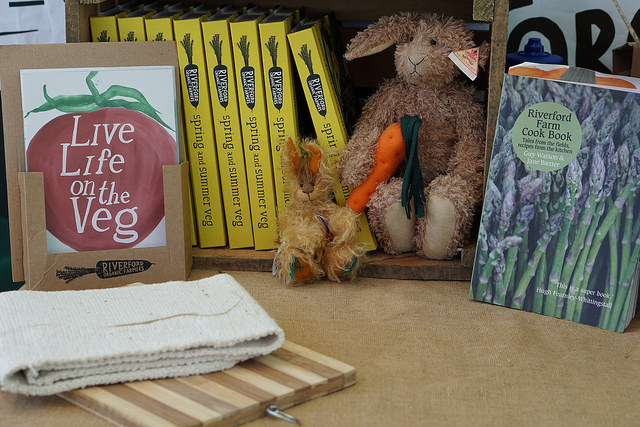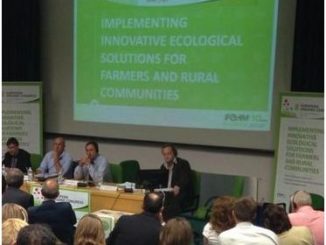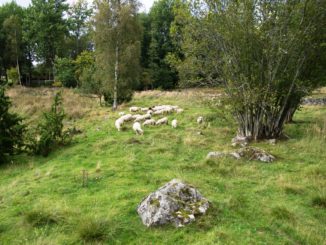
Photo (CC BY-NC 2.0) by Neil Alexander McKee Life on the Veg – Riverford Organic
“What does surprise me, given all the evidence to the contrary, is that anyone would think £30m would make you happier than £3m.”
So said Guy Singh-Watson of Riverford Organics, back in 2014. On the first day of June, Singh-Watson handed over almost ¾ of the business- known primarily for its organic veg box deliveries in the UK – to its employees.
Singh-Watson is well known for his honesty, his passion and indeed his rants (his word!). He has strong positions on a number of organic and business-related issues. See below for a thoughtful take on industralisation of organic farming and its impacts, including on how naturally – or otherwise – kale can grow with increased mechanisation. That this is made in a field of kale he is trying to decide whether its worth harvesting or now makes it all the more pertinent.
You are currently viewing a placeholder content from Default. To access the actual content, click the button below. Please note that doing so will share data with third-party providers.
Riverford has a turnover of £56.6 million annually, delivering veg and fruit boxes to up to 50,000 customers weekly.
There are five farms in the Riverford set up – in Devon, Cambridgeshire, Hampshire, North Yorkshire and France. There is also a restaurant, an on-site eatery at their Buckfastleigh base, and a certified organic gastropub, The Duke of Cambridge, in London. A number of local organic farms also supply Riverford for their deliveries.
You are currently viewing a placeholder content from Default. To access the actual content, click the button below. Please note that doing so will share data with third-party providers.
650 staff now own 74% of the company, with Singh-Watson retaining the remaining 26%. Employees were benefiting from sales, to the tune of a 10% share in annual profits, since the 1990s. The 74% is managed by an Employee Trust, where shares are held in trust for all staff equally – rather than a direct ownership model. The Trust is initially made up of Singh-Watson, two staff members and two external trustees.
This trust model Riverford has adopt maintains certain structures and values, with regard to staff, organics and long-term producer-supplier relations.
The employee-ownership model is often described, in the UK, as the John Lewis model, named after the department store which also owns Waitrose. With John Lewis, all 75,000+ staff are partners in the business.
According to Riverford: “John Lewis is a good model of how employee ownership can be combined with conventional management structure to achieve both commercial success and accountability to founding values. Riverford will continue to have a conventional board, recently strengthened by the appointment of its first two non-executive directors. In a few months an employee council will be elected. Two members will also become Trustees.”
Singh-Watson was motivated into action by two things: the sale to venture capitalists of rival veg delivery business Abel and Cole, and the fact that his family showed no interest in carrying on with the business.
In 2014, the now 58 year old wrote about succession planning. He said the following: “The sale of Abel & Cole to venture capitalists in 2007 precipitated a plague of oily suits from the city, snaking their way to my door and promising to lubricate my passage into well-heeled retirement. The prospect felt like selling one of my children to a brothel, plus, all the entrepreneurs that I have met who sold up are depressed…”…adding “the appalling situation at the Co-op bank shows that ideology and values can never be a substitute for competence and good management.”
He thinks a growth rate of 7 or 8% annually is necessary: “With this we can do new things and generate new opportunities for staff; but venture capitalists would want 30-40% growth” he told his local Devon newspaper.
The change of model is part funded by ethical bank Triodos. Singh-Watson will receive his own pay out over six years from this loan.
Undoubtedly outspoken – known for his pro-organic rants on youtube – Singh-Watson has, with this move, also emerged as something of a business innovator.
Announcing the change on his blog from 1st June, the Devon man said “I am convinced most people are kinder, less greedy, more creative, more thoughtful and can contribute more and be more productive than our institutions allow them to demonstrate. The best indication of business efficiency (and most valid prediction of future success) is getting the best out of people while giving the most back; return on capital is a poor, short-term proxy.”
This vision is laudable – to prioritise the type of business it is over personal gain is impressive. Its one thing professing this sort of approach – its quite another actually doing it when you are looking at 30 million pounds.
Its also the case that, while it is supplied by 40 organic producers in the region, and it function as the central hub and customer for the South Devon Organic Producers co-op, both of which make it affordable for local small producers to operate, other small to mid sized organic producers have a mixed opinion of Riverford. Privately, producers have told this author of how difficult it is to survive as an independent in the shadow of such a huge, comprehensive, well-financed organisation.
This has always been a point of discussion among organic producers and academics who study the area – do big initiatives like Riverford, or Able and Cole – develop markets or smother smaller producers? Does supplying a big reach player, which then sells on your veg, make more sense than supplying customers yourself directly? Riverford is, after all, both core to a co-op and a middle man for smaller producers. And who has stopped growing veg, who has stopped supplying local markets, because they were not willing to compromise, or to become merely a supplier? What is the local impact in this context?
That said, suppliers often like the stability of having multiple routes to market – a solid one where you sell on, and other more local or bespoke routes enabled by this steady income.
Nevertheless, supplying 50,000 people a week makes you a very big player by organic standards. Inevitably, the broader localised positives of mixed agroecologcal landscapes, of a flourishing of small to mid-sized independent producers, are impacted by mega distribution a la Riverford. Just how connected can the 50,000 consumers be to local producers, if these producers are known primarily as suppliers to Riverford?
And yet, by bringing in the 650 staff, Guy Singh-Watson has shows that he is thoughtful enough to reject aspects of standard conventionalisation in organic farming. After all, the 74% ownership these 650 workers now have de-concentrates and decentralises power – and the economic democracy of this chimes well with agroecological approaches. While it should not be down to the philanthropy of one especially driven and unusual individual to make these decisions, at least from now on, in the case of Riverford, it won’t be.
Agroecological approaches are not just about the field – the whole agri-food provisioning system is relevant when it comes to democratisation.
Meanwhile Guy intends to work more on permaculture and on developing no till practices in organics.
We’ll soon find out how his vision, like the one that led him to organics in the 1980s, will bear fruit (and veg).
A shorter version of this article also appeared in the Irish Examiner’s Farming supplement.





